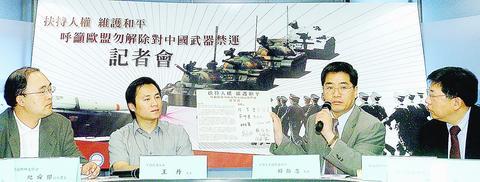As the EU prepares to discuss lifting its arms embargo on China in the coming months, academics and think tanks made a joint statement yesterday urging the EU not to make a move that may disrupt peace and stability in the Asia-Pacific region.
At a seminar hosted by the Taiwan Thinktank and the European Union Study Association-Taiwan, Wang Dan (王丹), a student leader during the 1989 Tiananmen Square demonstrations, pointed out that China's human rights record has not improved in the 15 years since its brutal repression of the democratic movement.

PHOTO: YEH CHIH-MING, TAIPEI TIMES
The EU imposed the arms embargo in 1989 as a sanction against the Chinese government's clampdown on pro-democracy demonstrators.
"Over these years, China's human rights record has not improved. Instead, it may have become worse," Wang said.
The EU has been deceived if it believes it can lift the embargo because the Chinese authorities respect human rights better now, he said.
"Fifteen years have passed since the Tiananmen Square movement. The Chinese government has not compensated or apologized to the victims. It even banned discussion on the event," Wang said.
He cited the example of Jiang Yanyong (蔣彥永), the Chinese surgeon who exposed China's SARS cover-up. He was jailed because he released a letter pressing China's Communist Party leaders to admit that the Tiananmen Square Massacre was wrong.
It is also distressing that the Chinese authorities continue to prohibit families of victims of the massacre from publicly mourning for their loved ones, he said.
"Is this a humane government?" Wang asked.
Wang, currently in exile, said many Chinese democracy activists in the US missed home and longed to return to China. He said one of his friends who is dying has not given up hope of going home and has been pleading with Chinese officials to allow him to return.
"Some have perished abroad without being able to see their families for the last time. Can we say such a government's human rights record has improved?" Wang said.
Wang added that French President Jacques Chirac, a main backer of lifting the EU arms embargo, has ignored oppression of human rights in China.
"The French Revolution greatly inspired us who pursued democracy in China and initiated the Tiananmen Square movement. Now we are very disappointed," he said.
Lin Cheng-yi (林正義), a research fellow at Academia Sinica, urged the legislature to pass a resolution to express Taiwan's opposition to the EU lifting the ban and awaken the Taiwanese people's awareness of the seriousness of the move.
If the ban is removed, the EU will be able to sell weapons to China, which threatens to use force against Taiwan if the latter seeks independence.
The EU, in deciding whether to lift the embargo, has to take the positions of the US and Japan into account, Lin said.
Lin, a former senior advisor to the National Security Council, called on the EU to reconsider its "Code of conduct on arms exports," which states that the issuing of export licenses for arms should be halted if there is a risk of proliferation or that the weapons will be used in human rights abuses.
Lai I-chung (賴怡忠), director of Taiwan Thinktank's Foreign Policy Studies, said lifting the arms embargo on China will heighten China's confrontation with the US, Taiwan's long-time arms supplier.

An essay competition jointly organized by a local writing society and a publisher affiliated with the Chinese Communist Party (CCP) might have contravened the Act Governing Relations Between the People of the Taiwan Area and the Mainland Area (臺灣地區與大陸地區人民關係條例), the Mainland Affairs Council (MAC) said on Thursday. “In this case, the partner organization is clearly an agency under the CCP’s Fujian Provincial Committee,” MAC Deputy Minister and spokesperson Liang Wen-chieh (梁文傑) said at a news briefing in Taipei. “It also involves bringing Taiwanese students to China with all-expenses-paid arrangements to attend award ceremonies and camps,” Liang said. Those two “characteristics” are typically sufficient

A magnitude 5.9 earthquake that struck about 33km off the coast of Hualien City was the "main shock" in a series of quakes in the area, with aftershocks expected over the next three days, the Central Weather Administration (CWA) said yesterday. Prior to the magnitude 5.9 quake shaking most of Taiwan at 6:53pm yesterday, six other earthquakes stronger than a magnitude of 4, starting with a magnitude 5.5 quake at 6:09pm, occurred in the area. CWA Seismological Center Director Wu Chien-fu (吳健富) confirmed that the quakes were all part of the same series and that the magnitude 5.5 temblor was

The brilliant blue waters, thick foliage and bucolic atmosphere on this seemingly idyllic archipelago deep in the Pacific Ocean belie the key role it now plays in a titanic geopolitical struggle. Palau is again on the front line as China, and the US and its allies prepare their forces in an intensifying contest for control over the Asia-Pacific region. The democratic nation of just 17,000 people hosts US-controlled airstrips and soon-to-be-completed radar installations that the US military describes as “critical” to monitoring vast swathes of water and airspace. It is also a key piece of the second island chain, a string of

The Central Weather Administration has issued a heat alert for southeastern Taiwan, warning of temperatures as high as 36°C today, while alerting some coastal areas of strong winds later in the day. Kaohsiung’s Neimen District (內門) and Pingtung County’s Neipu Township (內埔) are under an orange heat alert, which warns of temperatures as high as 36°C for three consecutive days, the CWA said, citing southwest winds. The heat would also extend to Tainan’s Nansi (楠西) and Yujing (玉井) districts, as well as Pingtung’s Gaoshu (高樹), Yanpu (鹽埔) and Majia (瑪家) townships, it said, forecasting highs of up to 36°C in those areas